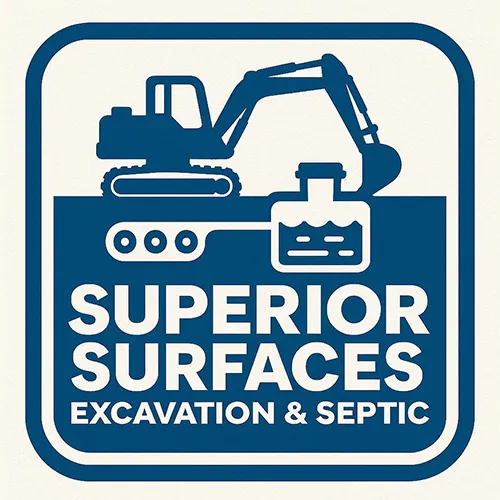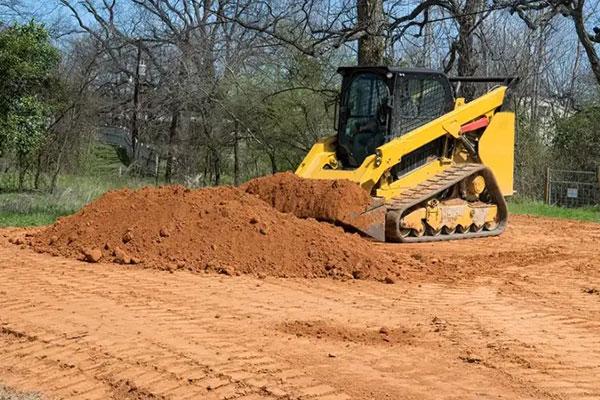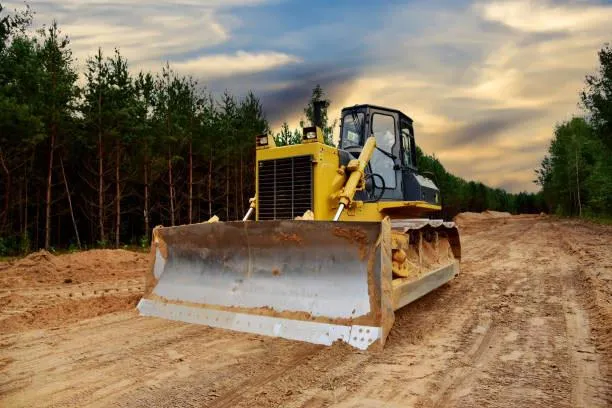
Serving Michigan counties: Macomb, St Clair, Wayne, Oakland, Genesee, and Tuscola Counties
Dozer Work near Macomb County, Michigan
Superior Surfaces LLC is Committed to superior quality and results!

AVOID COSTLY MISTAKES:
Do NOT hire an excavating contractor without first reading our free guide:
The ULTIMATE Excavation & Septic "Success Guide."

Dozer work near Macomb County, Michigan: What It Means For Your Project
If you’re planning a new build, barn, driveway, or reshaping a soggy backyard, proper soil moving is key—and that’s where dozer work comes in. A dozer pushes, cuts, levels, and reshapes land to create a stable, well-draining foundation. This guide explains what “dozer work near Macomb County” includes, its benefits, risks of cutting corners, and the hiring process in Michigan to keep your project on track.
How Can We Help?


Dozer work near Macomb County: What It Includes
Dozer work isn’t one single task; it’s a toolkit. For most residential and light commercial jobs in and around Macomb County, the scope typically includes:
Site clearing and rough grading to create a safe, buildable pad.
Cutting high spots and filling low spots to achieve plan elevations.
Driveway construction and reshaping for proper slope and traction.
Swale creation and drainage shaping to move water where it should go.
Pond berm touch-ups, shoreline shaping, and spoil management.
Tree, brush, and stump pushing where permitted, with haul-off as needed.
Spreading imported base, topsoil, or screenings for the final grade.
Backfilling foundations and tightening up around structures without over-compacting utilities.
Building or repairing gravel roads on rural parcels, with crown and ditch lines for longevity.
The common thread: controlled earthmoving. A skilled operator reads the land, follows the plan, and constantly checks grade so the finished surface does what you need it to do—shed water, carry loads, and look clean.
Benefits of hiring Dozer work near Macomb County
Predictable drainage. Grading is the quiet hero of every successful project. Done right, water leaves your structures instead of sneaking toward them.
Time savings. A competent dozer operator moves more material in an hour than a weekend warrior can touch with a rented skid steer.
Cost control. Efficient pushes, fewer reworks, and smart material placement trim wasted labor and fuel.
Stronger foundations. Pads and roads that are graded to spec support concrete, pavers, and vehicles for the long haul.
Cleaner finish. Edges, slopes, and tie-ins look intentional, not accidental—important for inspections and resale value.
Safety. Stable slopes, clear sightlines, and compacted transitions reduce hazards on active sites.
Local knowledge. Crews familiar with Michigan soils and weather patterns plan work windows and material choices that hold up through freeze-thaw cycles.
See Our Excavation and Septic

✔️ Commercial Excavation
✔️ Residential Excavation
✔️ Basement Excavation
✔️ Demolition
✔️ Large Pond Construction
✔️ Small Pond Construction
✔️ Dozer Work
✔️ Forestry Mulching
✔️ Grading, Lot Clearing
✔️ Retaining Walls
✔️ Concrete Flatwork - Driveways, Sidewalk, Foundations
✔️ Foundation Repairs
✔️ Full Site Preparation
✔️ Foundation Repairs
Quality Services Launched FAST!

✔️Septic Install and Repair
✔️ Septic Inspections
✔️ Septic Installs Traditional Systems
✔️ Septic Tanks - Plastic/Poly
✔️ Septic Tanks - Concrete
✔️ Drain Field Replacement
✔️ Drainage Systems
✔️ Aerobic Treatment Systems
✔️ French Drains
✔️ Trenching
What Are You Waiting For?
The process for hiring Dozer work near Macomb County, Michigan
1) Define the outcome. List the problems you want solved—standing water, soft driveways, low pads, poor access. Photos and a quick sketch help.
2) Share a simple plan. If you have engineered drawings, great. If not, rough dimensions, elevations, and any utility locations will do for an initial look.
3) On-site walk-through. A short visit confirms haul routes, soil conditions, tree saves, and where spoils can go. In Michigan, confirm any permit triggers before starting.
4) Transparent scope and line-item estimate. Expect clear quantities: hours, materials, trucking, and mobilization. Ask how weather delays are handled.
5) Schedule and prep. Line up locate tickets, access, staging, and erosion controls. Good prep keeps the dozer pushing instead of waiting.
6) Execute with checks. The operator cuts to grade, verifies slopes, and ties transitions into surrounding areas. You’ll see progress that matches the plan.
7) Final walk-through and maintenance tips. Confirm drainage paths, driveway crown, and soil stabilization. Get advice for the first heavy rain and seasonal care.
How “Dozer work near Macomb County” fits into Michigan projects
Michigan brings freeze-thaw cycles, clay pockets, and surprise springs. Solid dozer work accounts for all three. Pads should sit high enough to shed water. Driveways need a base that resists pumping during thaws. Ditches and swales should be sized so stormwater has a predictable route instead of carving its own. When earthmoving anticipates seasons, you avoid the annual ritual of patching washouts.
Common pitfalls to avoid
Skipping drainage. Flat yards are pretty until a storm hits. A subtle slope often solves the “mystery” puddle forever.
Starting without locates. Utilities don’t care that your project is small. Call before anyone digs.
Chasing the lowest bid. Cheap production can mean thin base, sloppy tie-ins, and expensive do-overs.
Working wet. Pushing mud creates ruts and soft spots that haunt you later. A short wait for drier conditions can save money.
Ignoring access. Tight, muddy access burns hours and tempers. Plan haul routes like you plan the work itself.
Materials, access, and timing
The right stone or screenings under a driveway or pad can make or break durability. In a Michigan spring, for example, a few warm, dry days can turn an impossible site into a productive one. Ask for a window, not just a date, and build flexibility into your plan.
How to compare estimates for dozer work
Look beyond the bottom line. Check whether each bid includes mobilization, erosion control, compaction, base thickness, and finish grading. Confirm who is responsible for handling permits and utility locates. Ask what is excluded, how rock or unsuitable soils are handled, and whether cleanup and seed/straw are in or out.
Hours: Monday-Saturday 6:00am-6:00pm
Extended hours by appointment only.
Address: 23450 29 Mile Rd, Ray, MI 48096, USA
All rights reserved | Client Support Area